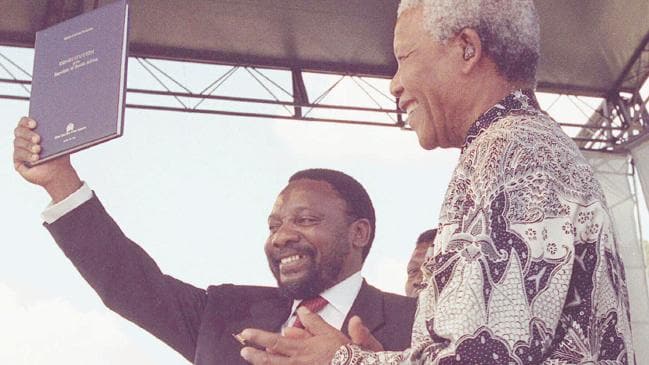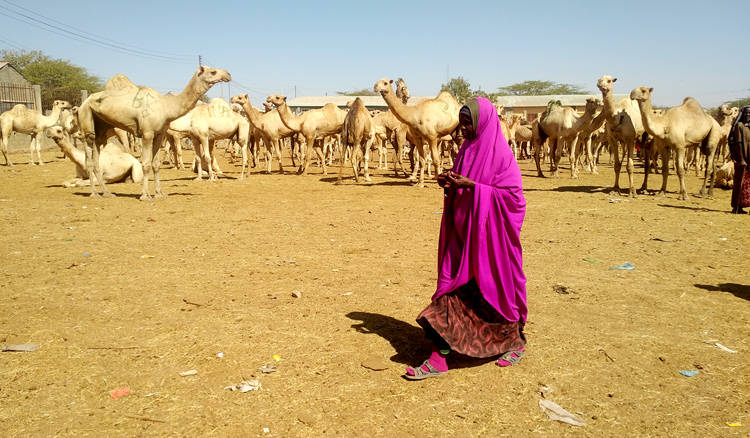News
Zimbabwe's land lesson for South African leader
Implementing a land expropriation without compensation policy would be economically disastrous.

Director, The Brenthurst Foundation

Former President and CEO of the NEWSEUM, USA

Argentine populist Juan Peron said “indicate left but turn right”. This is sage advice South Africa’s new President, Cyril Ramaphosa, would do well to heed.
Ramaphosa faces numerous populist demands to blunt the still-obvious inequalities that came from apartheid in South Africa, but redistribution will not work. He must reignite an economy that has stumbled badly in part because investors lack confidence in the South African government. Nowhere is this quandary more challenging than on the issue of land.
Moving to take land will signal to farmers and the entire private sector that property rights are up for grabs in South Africa and it is almost certainly a recipe for disaster. It is particularly worrying that Ramaphosa, in the early days of his presidency, has endorsed “expropriation without compensation”. While he assures the country that “smash and grab” land seizures will not happen, his is a lose-lose strategy.
Ramaphosa’s accession to the presidency in February, after the forced resignation of Jacob Zuma, has raised hopes that the systemic theft and mismanagement that has afflicted South Africa since the advent of the Zuma administration in 2009 will be reversed. Ramaphosa played a critical role in negotiating the end of apartheid. After the transition, he was “deployed” by president Nelson Mandela to the private sector, where he became exceptionally rich on the basis of his connections and favourable business deals inspired by the government’s desire to cultivate an African business elite. He became deputy president in 2014 but seemed to do little from the inside to counter Zuma’s rapacious rule. In his inaugural state-of-the-nation address, shortly after becoming President, Ramaphosa nonetheless promised a “new dawn” and vowed to “turn the tide of corruption in our public institutions”.
The new President has moved cautiously. He dismissed some of the worst of Zuma’s cabinet and has put together a good economic and finance team. However, he missed the opportunity to clean house and signal a sharp break with the past, preferring to keep the party together rather than aggressively pursue reform, balancing the factions within the ruling African National Congress through his appointments.
It may not be possible to parse the land issue so carefully. Here much can be learned from Zimbabwe’s experience. After independence in 1980, Robert Mugabe promoted reconciliation with his former Rhodesian adversaries. As Rhodesian prime minister Ian Smith put it after meeting Mugabe, “He behaved like a balanced, civilised Westerner, the antithesis of the communist gangster I had expected.” It seemed also like an example of a politician who was using fiery rhetoric to build popular support but who was going to avoid, as he and his party officials often said, the mistakes made in other parts of Africa. Explicitly, they recognised that agriculture could be a major part of Zimbabwe’s future growth.
However, as the honeymoon dulled, and delivery failed to match the early promise, the politics shifted and policy disastrously followed suit. A new ruling elite emerged, controlled through a vast system of patronage centred on the party, with access to farms, jobs and contracts. With growing frustration at the slow pace of development, in November 1997 the government published a list of 1500 white farms to be expropriated, even though nearly half of these farmers had purchased their land since independence. Once privileged because of their economic contribution, the white farmers had become a juicy political target, owning nearly 40 per cent of all land and two-thirds of the best farming areas.
With one-third of listed companies dependent on the agriculture sector, the stock exchange plummeted. By the turn of the 21st century, living conditions among average Zimbabweans had worsened, with real wages falling by a fifth since independence, unemployment at 50 per cent and annual inflation at 60 per cent.
If land were the fuel to satisfy an increasingly restless population, the referendum on a new constitution in February 2000 was the spark. When Mugabe’s draft constitution allowing land expropriation without compensation was defeated in the face of considerable opposition, in part organised by the (mainly white) Commercial Farmers Union, the farm invasions began just 10 days after the referendum.
Realising that the farmers, like other Zimbabweans, derived strength from ownership, Mugabe took it away and dispensed the proceeds, though not the title, to his followers. Keeping everyone beholden to the state (with all land vested in the president) solidified and tightened Mugabe’s grip on power. Across the next 17 years 4200 farmers were evicted from eight million hectares of land. Income per capita, which was $1255 in 1981, plummeted to just $541 in 2008.
In South Africa’s urbanised society, the amount of land hunger is unclear. Most Africans, when offered the choice, prefer cash compensation to land. The government itself also owns large tracts of land that could be distributed before touching the agrarian private sector. The reason for the land issue now is that it has enormous symbolic value as the issue where whites physically appropriated the asset on which Africans had previously based their livelihoods. It is therefore an especially powerful cudgel with which those to the left of Ramaphosa can use to push the government more in a socialist, redistributive direction.
Zimbabwe’s lesson for Ramaphosa is that implementing a land expropriation without compensation policy would be economically disastrous. Even talking about it will seed doubts in the minds of prudent investors given the lesson to South Africa’s north. It may be tempting to use carefully balanced rhetoric and symbols to counter such an emotive issue. However, the stakes are high. South Africa may find that once it starts taking an asset of enormous value, every investor will be worried that they are next.
Jeffrey Herbst is a senior fellow and Greg Mills the director of the Johannesburg-based Brenthurst Foundation. They are co-authors of Making Africa Work.
This article was originally published in The Australian.


